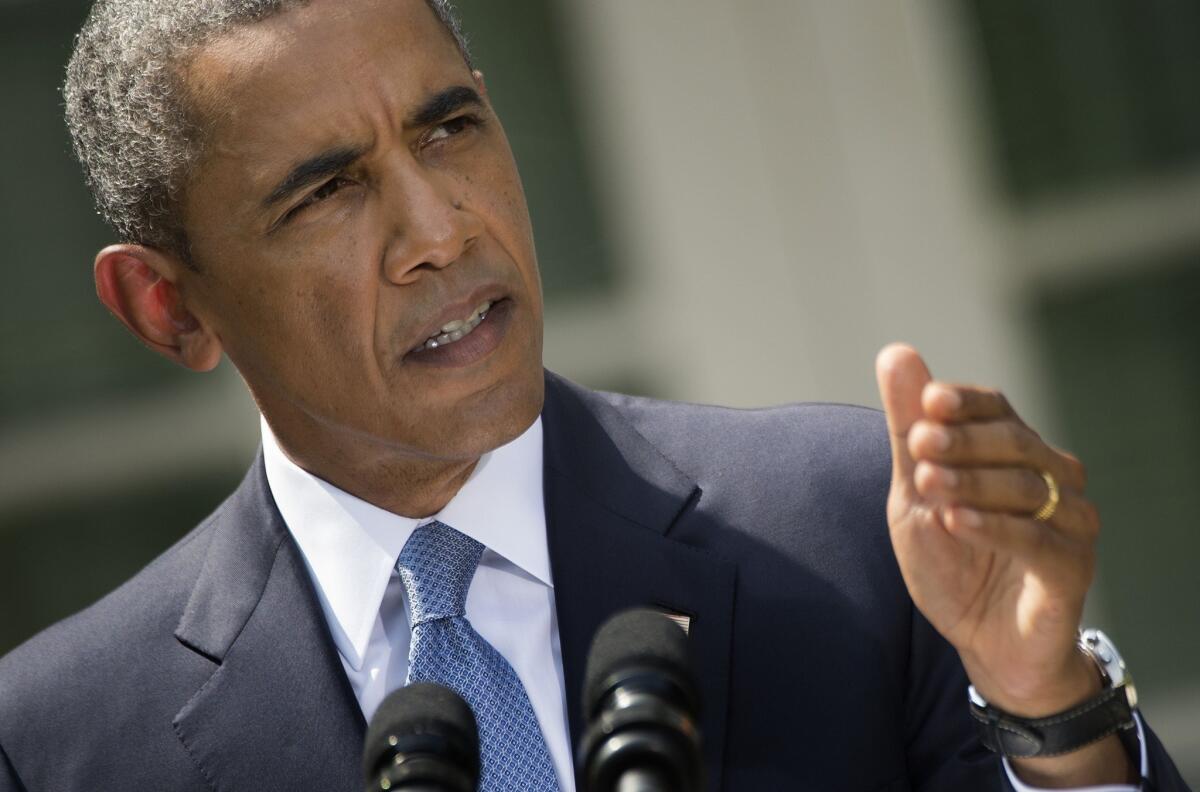Congressional vote on Syria fraught with political peril

- Share via
WASHINGTON -- President Obama’s decision to seek congressional authorization for a strike on Syria may not be such good news for lawmakers who have been pushing Obama to listen to them.
Now they may be pinned down on a vote fraught with political peril.
Supporting another Middle East intervention may be politically toxic, as President Obama found out this week when the usually reliable British bailed out on participation in a U.S.-led attack, and other governments took a conveniently low profile.
But many lawmakers don’t want to be seen avoiding any U.S. military role in the Middle East, in part because ally Israel still wants U.S. help as the fallout of the Syrian civil war spills across the country’s borders.
“While Israel is taking care not to appear involved in the crisis, it quietly expects Washington to take meaningful action,” Michael Herzog of the Washington Institute for Near East Policy wrote in an analysis. “Israelis believe that U.S. credibility among local and international actors is at stake, especially in Iran. Erosion of American deterrence would be bad for Israel as well as Washington.”
DOCUMENT: U.S. chemical weapons intel
In addition, Democrats don’t want to be seen to be abandoning President Obama on a dirty job, that as Obama said Friday, many want done but nobody wants to handle.
Because of these complications, many lawmakers have been trying to avoid committing too firmly on the issue.
“If the strikes come off quickly and cleanly without requiring a risky vote in Congress, a lot of people would be just as happy,” said a former Democratic Senate aide before Obama announced his decision to seek a vote. He asked to remain unidentified because of the sensitivity of the issue.
Sen. Carl Levin (D-Mich.), chairman of the Senate Armed Services Committee, has been cautious on the issue, urging that strikes be delayed until the United Nations team inspecting the chemical weapons attack site completes its work. The team has left Syria, but its analysis of tissue and soil samples could take weeks.
He warned that the effect of a strike would be “weakened” if it didn’t have the support of a large number Arab countries, which it is not likely to get.
Sen. Chris Coons (D-Del.), strongly condemned the use of chemical weapons and called for “decisive action.” But when it appeared that it might be only hours before U.S. missiles were launched, Coons said in a statement late Friday that he was still weighing the issue.
The Republican leadership is struggling to balance pressure from its large hawk contingent with the passionate resistance from the anti-interventionist libertarian faction, including Sen. Rand Paul (R-Ky.).
House Speaker John Boehner has been demanding more consultations, but stopping short so far of committing to airstrikes.
After a phone conversation with Obama, Boehner said he wanted more consultation, and more information from the White House on any attack’s strategy and legal justification. “It is clear that further dialogue and consultation with Congress, as well as communication with the American public, will be needed,” he said in a statement Thursday.
Sen. John Cornyn (R-Texas) has stopped short of endorsing strikes, saying Obama needed to first “explain what vital national interests are at stake” and put forth a “detailed plan with clear objectives.”
ALSO:
Phony intel on Iraq WMD haunting U.S. claims of Syria threat
Obama calls for congressional approval for military strike on Syria
France, ironically, stands as strongest U.S. ally in sanctioning Syria
More to Read
Sign up for Essential California
The most important California stories and recommendations in your inbox every morning.
You may occasionally receive promotional content from the Los Angeles Times.














